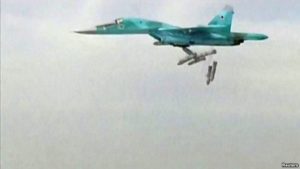by WorldTribune Staff, August 19, 2016
Russia’s use of Iranian air bases to launch attacks in Syria has ignited an intense debate in the Islamic Republic, which is obsessive about the issue of sovereignty.
Ali Larijani, the influential speaker of Iran’s parliament, responded to concerns raised by a fellow conservative lawmaker, Heshmatollah Falahatpishe, who questioned the cooperation with Russia while describing Moscow’s foreign policy as “very different” and “turbulent and volatile at times.”

“Based on Article 146 of the constitution, establishing any foreign military base in the country is banned, and we haven’t given a military base to anyone,” Larijani was quoted by Iranian media as saying.
“The fact that we cooperate with Russia as our ally on regional issues, such as Syria, does not mean that we have provided Russia with a military base,” Larijani added.
Alex Vatanka, a senior Iran analyst at the Washington-based Middle East Institute, told Radio Free Europe/Radio Liberty (RFE/RL) the cooperation with Russia is likely to present a significant challenge for Iranian officials to explain.
“This notion that Iran as an Islamic republic works with Christian Russia and operates hand in hand [with Russia] in another Muslim country, in Syria, it just raises a host of difficult questions that surely will be difficult for days and weeks to come for the Iranian regime to justify,” Vatanka said.
The RFE/RL analysis noted that “Iranian officials have increasingly painted the conflict in Syria as the front line of a battle to defend Islam, including in order to recruit volunteers to travel to join thousands of other Iranians in the fighting there.”
The reformist Shargh daily newspaper noted in a recent article that, after the first reports that Russian bombers were using Iranian territory, “Iranians are highly sensitive about the preservation of their national sovereignty and their constitution.”
Another pro-reform media outlet, Etemad, warned that “Iran should bear in mind that Russia has acted against Iran’s expectations and requests when [Moscow’s] interests have dictated it.”
Vatanka said that while allowing Russia to use its military base might represent a joint effort by to strengthen Syrian President Bashar Assad’s militarily, the partnership could also be an attempt by Teheran to send a signal to Washington.
“’We’ve concluded a nuclear deal with the West, but we’re still not seeing the benefits, the fruits of the sanctions relief,’ ” Vatanka speculated about Iran’s possible thought process. ” ‘We still feel the United States is not doing its part. What do we do to get the United States attention? Perhaps by playing the Russia card, we can do that.’ ”
According to RFE/RL, a senior Iranian lawmaker “said the decision to allow Russian bombers to fly out of Shahid Nojeh air base near Hamadan was made following a directive by the country’s Supreme National Security Council, which is chaired by President Hassan Rouhani and includes the heads of the judiciary, the army, the Islamic Revolutionary Guards Corps (IRGC), and other powerful institutions.”
UK-based analyst Saeed Barzin said Iran’s strategic military cooperation with Russia is significant, particularly as the United States is being accused by Iranian officials of dragging its feet in implementing the nuclear deal.
“Losing hope that the U.S. is willing to become a partner, the [Iranian] military establishment, to say the least, is now more keen to work with the Russians,” Barzin says, adding in connection with an increasingly bitter regional rivalry between Shi’a-dominated Iran and Sunni-dominated Saudi Arabia: “Strategic cooperation with the Russians should also give Saudis the jitters, particularly now that they have openly declared a policy of confrontation with Iran.”
“Independence” was one of the main slogans of the 1979 revolution that led to Iranian religious and political leaders’ creation of an Islamic republic that has prided itself on being, in its organizers’ words, “neither pro-Western nor pro-Eastern.”
